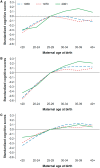The reversing association between advanced maternal age and child cognitive ability: evidence from three UK birth cohorts
- PMID: 28177512
- PMCID: PMC5837600
- DOI: 10.1093/ije/dyw354
The reversing association between advanced maternal age and child cognitive ability: evidence from three UK birth cohorts
Abstract
Background: Studies on advanced maternal age-defined here as age 35 or older-and children's cognitive ability report mixed evidence. Previous studies have not analysed how the time period considered in existing studies influences the association.
Methods: We analysed trends in the association between maternal age and cognitive ability using data from the 1958 National Child Development Study ( n = 10 969), the 1970 British Cohort Study ( n = 9362) and the 2000-2002 Millennium Cohort Study ( n = 11 600). The dependent variable measures cognitive ability at age 10/11 years. Cognitive scores were standardised to a mean of zero and a standard deviation of one.
Results: For the 1958-70 cohort studies, maternal ages 35 -39 were negatively associated with children's cognitive ability compared with maternal ages 25-29 (1958 cohort β = -0.06 standard deviations (SD) 95% confidence interval (CI): -0.13, -0.00; 1970 cohort β = -0.12 SD 95% CI: -0.20, -0.03). By contrast, for the 2000-2002 cohort study maternal ages 35-39 were positively associated with cognitive ability (β = 0.16 SD 95% CI: 0.09, 0.23). For maternal ages 40+, the pattern was qualitatively similar. These cross-cohort differences were explained by the fact that in the earlier cohorts advanced maternal age was associated with high parity, whereas in the 2000-2002 cohort it was associated with socioeconomically advantaged family background.
Conclusions: The association between advanced maternal age and children's cognitive ability changed from negative in the 1958 and 1970 cohorts to positive in the 2000-2002 cohort because of changing parental characteristics. The time period considered can constitute an important factor in determining the association between maternal age and cognitive ability.
Keywords: Advanced maternal age; cognitive ability; secular change.
© The Author 2017. Published by Oxford University Press on behalf of the International Epidemiological Association
Figures

Similar articles
-
Decline in the negative association between low birth weight and cognitive ability.Proc Natl Acad Sci U S A. 2017 Jan 3;114(1):84-88. doi: 10.1073/pnas.1605544114. Epub 2016 Dec 19. Proc Natl Acad Sci U S A. 2017. PMID: 27994141 Free PMC article.
-
How Are Children of Older Mothers Doing? Evidence from the United Kingdom.Biodemography Soc Biol. 2015;61(3):231-51. doi: 10.1080/19485565.2014.1001887. Biodemography Soc Biol. 2015. PMID: 26652679
-
Maternal cell phone use during pregnancy and child cognition at age 5 years in 3 birth cohorts.Environ Int. 2018 Nov;120:155-162. doi: 10.1016/j.envint.2018.07.043. Epub 2018 Aug 7. Environ Int. 2018. PMID: 30096609
-
Maternal prepregnancy BMI and child cognition: a longitudinal cohort study.Pediatrics. 2013 Jan;131(1):56-63. doi: 10.1542/peds.2012-0788. Epub 2012 Dec 10. Pediatrics. 2013. PMID: 23230067
-
Dietary patterns in early childhood and child cognitive and psychomotor development: the Rhea mother-child cohort study in Crete.Br J Nutr. 2016 Apr;115(8):1431-7. doi: 10.1017/S0007114516000246. Epub 2016 Feb 18. Br J Nutr. 2016. PMID: 26887648
Cited by
-
Age-specific effects on adverse pregnancy outcomes vary by maternal characteristics: a population-based retrospective study in Xiamen, China.BMC Public Health. 2023 Feb 14;23(1):326. doi: 10.1186/s12889-023-15235-4. BMC Public Health. 2023. PMID: 36788527 Free PMC article.
-
The Association Between Parental Age and Autism-Related Outcomes in Children at High Familial Risk for Autism.Autism Res. 2020 Jun;13(6):998-1010. doi: 10.1002/aur.2303. Epub 2020 Apr 21. Autism Res. 2020. PMID: 32314879 Free PMC article.
-
Newborn Health Indicators Associated with Maternal Age during First Pregnancy.Int J Environ Res Public Health. 2019 Sep 17;16(18):3448. doi: 10.3390/ijerph16183448. Int J Environ Res Public Health. 2019. PMID: 31533243 Free PMC article.
-
Fertility History and Physical and Mental Health Changes in European Older Adults.Eur J Popul. 2018 Apr 26;35(3):459-485. doi: 10.1007/s10680-018-9489-x. eCollection 2019 Jul. Eur J Popul. 2018. PMID: 31372101 Free PMC article.
-
Neighbourhood material deprivation and severe maternal morbidity: a population-based cohort study in Ontario, Canada.BMJ Open. 2021 Oct 6;11(10):e046174. doi: 10.1136/bmjopen-2020-046174. BMJ Open. 2021. PMID: 34615673 Free PMC article.
References
-
- Sobotka T. The Postponement of Childbearing and Low Fertility in Europe .Amsterdam: Dutch University Press, 2004.
-
- Jacobsson B, Ladfors L, Milsom I. Advanced maternal age and adverse perinatal outcome. Obstet Gynecol 2004;104:727–33. - PubMed
-
- Carolan M, Frankowska D. Advanced maternal age and adverse perinatal outcome: A review of the evidence. Midwifery 2011;27:793–801. - PubMed
Publication types
MeSH terms
LinkOut - more resources
Full Text Sources
Other Literature Sources
Medical

